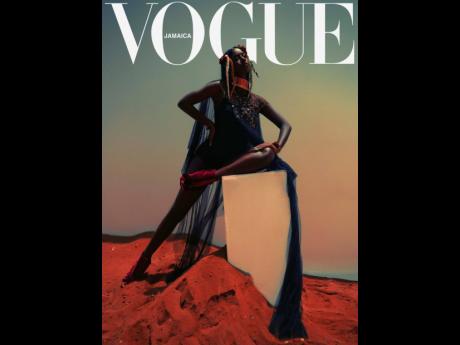Wade Rhoden makes Vogue
As the Black Lives Matter movement continues to gather momentum in the United States, the fashion industry has been roped into the fight against systemic racism. For the past week, the hashtag #VogueChallenge has been going viral on social media as black models and photographers put forward their work as covers of the widely popular American fashion magazine Vogue. With many Jamaicans lending their voices to the fight against racism from the onset, it perhaps came as no surprise when it was discovered that a Jamaican model and photographer (Abihail Myrie and Wade Rhoden) were participants in the popular social media challenge. But what has come as a shock to many, is the fact that the cover submitted by these Jamaican talents has become one of the most popular images in the challenge.
In an exclusive interview with The Gleaner, fashion photographer Wade Rhoden expressed that although he usually shys away from social media challenges, he decided this one was worth his time because of the message it was sending. “I am really more of a phantom on social media. There isn’t much of my physical presence on Instagram, it’s more of my work. But I got constant messages from people saying, ‘Why yuh do not enter,’ even from family members. My little brother was telling me that out of all of the challenges on social media, this one was something he felt I had to do. I looked at it and I said you know what, this one actually makes some sense,” he said. “Not only was it good PR, but the cause was good. It’s in line with the whole Black Lives Matter thing because as you know, Vogue is a magazine that is completely white-washed, that’s not a secret. This challenge was brought forward to show that black people can make the covers too, and it can be good-quality, top-notch productions.”
He said the challenge hit close to home because as a black man, he can relate to being underserved and under-represented because of the colour of his skin, especially in the fashion industry. “As a black person, I have a responsibility to bring awareness to issues affecting my race in any way that I can. This was my two cents to help the movement. We want to show the fashion industry that we are good enough,” he said. “The racial issue has been an ongoing one; it nuh take nothing much to see that it still exists, especially in the fashion world. Black people don’t really hold positions of power in the industry. The first black photographer to shoot a Vogue cover was Tyler Mitchell in 2018 when he photographed Beyonce. It took a black person of power to insist on the inclusion of a black person on that shoot. If Beyonce wasn’t Beyonce, she couldn’t have asked for that,” he said.
According to Rhoden, Vogue is now seeing that black content creators are just as capable of producing work that is in keeping with their standards. He is especially proud to be a part of the movement as he believes the covers are consistent with the standards of Vogue but with black models and black photographers.
Rhoden, who has been in the field of fashion photography for 10 years, says the ball is now in Vogue’s court to change the fashion narrative. “ Vogue has a following, you can’t go round it. They have a certain amount of global traction, a cult following, and that following is not just made up of white people, and so they have a duty to cater to all people from all races,” he said.
“The quality of the entries were just as good as any of the Vogue covers, and I’m pretty sure that the majority of these images were created with half the budget it takes to produce a Vogue cover. We created the same aesthetic with less money and less resources as black people, and it has the same look and feel. That just goes to show how resourceful we are as black people. We ‘tun we hand make fashion’ is not just a saying for us, it’s a lifestyle.”




